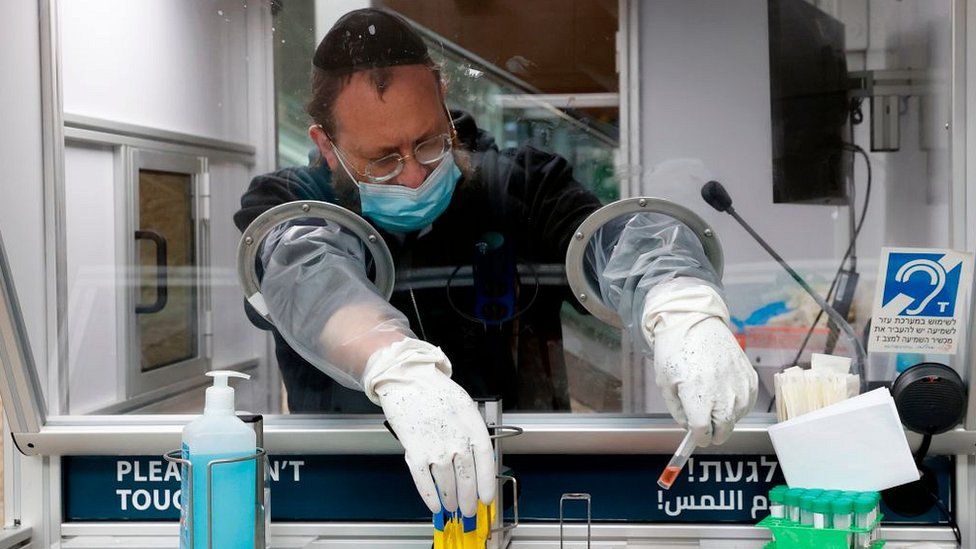
And scientists are watching data shared by the country keenly, for signs of how effective the vaccine is when given to a whole population.
So there was understandable concern when the man coordinating Israel's Covid response reportedly suggested a single dose of the Pfizer vaccine might not be as effective as reported.
Thousands of people have tested positive after being jabbed. But are worries premature?
Addressing Prof Nachman Ash's quotes, the Israeli Ministry of Health said: "The comments of the Israeli Covid-19 commissioner regarding the effect of the first dose of the vaccine were out of context and, therefore, inaccurate.
"The commissioner said we have yet to see a decrease in the number of severely ill patients.
"As the second dose is now given to the most vulnerable of the population, we expect to soon see the full protective impact of the vaccine."
After vaccination, the body needs time to recognise the virus's genetic material and mount an immune response - producing the antibodies and T-cells that block the virus from entering cells and killing off those cells that do become infected.
And it takes over two weeks to really take effect, say immunologists, including Prof Danny Altmann at Imperial College London, say.
'Early protection'
Clalit, Israel's largest healthcare provider, covering most of the population, compared the medical records of 200,000 vaccinated over-60s with the same number belonging to unvaccinated people.
For two weeks after the first dose, both groups tested positive for the virus at roughly the same rate.
But then those vaccinated started to show 33% fewer new infections than the others.
"This is very early protection," said Clalit chief innovation officer, Ran Balicher, who is also a public health professor advising the government.
And "already there is a 33% fall".
Infections continued to decline after that.
But there were too few for Prof Balicher to calculate by what percentage.
Same trend
The London School of Hygiene and Tropical Medicine's Prof Stephen Evans said: "It is not sensible to compare efficacy derived from an observational study of this type, which is subject to many biases, with the efficacy derived from randomised trials [such as those performed to test the vaccine in the first place]."
But the early evidence does follow roughly the same trend seen in Pfizer's clinical trials, which involved tens of thousands of people.
In those trials, the rate of new infections in the vaccinated and control groups also diverged after two weeks.
And that gap kept widening for more than 100 days after the first dose.
Severe Covid
Israel began vaccinating on 19 December, reaching 10% of its population by the end of 2020.
And now, about half a million of its nine million population have received two doses.
Given the time it takes for immunity to build and unvaccinated people to become exposed to the virus, incubate it and develop symptoms, the national data would not be expected to reflect the impact of vaccination for at least a month.
But Prof Balicher suggests some impact on severe Covid illness across Israel could be expected to be seen later this week.
Less effective
Pfizer hopes two doses of the vaccine will give up to 95% protection.
But even a much less effective vaccine could make the difference between a survivable illness and a fatal one.
The annual flu vaccine is about 40-60% effective.
And it stops hundreds of thousands of people from dying every year.
Fatal disease
"Efficacy against detected Covid-19 may be less important... than efficacy against hospitalisation and death," Prof Evans said.
And more people were likely to be protected from a severity of illness requiring admission to hospital than infection rates alone suggested.
The Clalit data, for example, does not distinguish between mild or symptomless infections and more severe or even fatal disease.
The judgement made in the UK was more lives could be saved by giving a larger group one dose quicker than giving a smaller group the maximum protection conferred by two doses.
And Prof Evans said: "The reports that have come from Israel are insufficient to provide any evidence that the current UK policy in regard to delaying the second dose of vaccines is in any way incorrect."

- YOUR QUESTIONS: We answer your queries
- GLOBAL SPREAD: How many worldwide cases are there?
- THE R NUMBER: What it means and why it matters
- TEST AND TRACE: How does it work?
- TREATMENT: How close are we to helping people?

World - Latest - Google News
January 21, 2021 at 07:04AM
https://ift.tt/3iA9Vue
Covid: Israel vaccine fears 'out of context and inaccurate' - BBC News
World - Latest - Google News
https://ift.tt/2SeTG7d
Bagikan Berita Ini














0 Response to "Covid: Israel vaccine fears 'out of context and inaccurate' - BBC News"
Post a Comment